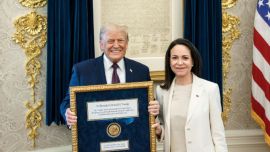The signals from Washington could not have been clearer: approach and seek dialogue.
Even though Argentina is the biggest debtor of the International Monetary Fund, owing it some US$57 billion, and given that the United States is the largest stakeholder in that multilateral financial institution, the signals arrived with precise timing and with an even more precise aim: acompañar.
A few hours before Alberto Fernández boarded his first international flight as president-elect, heading off to visit Andrés Manuel López Obrador (otherwise known as ‘AMLO’) in Mexico, Donald Trump rang Buenos Aires to congratulate his future counterpart.
It was only four days after the election and the White House’s tireless tweeter transmitted to the future resident of the Pink House “the United States’ desire to continue positive bilateral cooperation, especially with respect to security, democracy and economic development,” while highlighting (according to the White House press release) “the many positive effects of United States engagement with Argentina,” and expressing “the United States’ support for helping it overcome economic challenges.”
Crystal clear. The statements emanating from the White House generally tend not to be very specific, with diplomatic twitches holding them back. But that was not the case here. “Positive effects of the engagement,” “support” in overcoming “economic challenges.” Translated: We are here to help.
While in Mexico City, Argentina’s president-elect received two key men who had flown from Washington. He lunched with Mauricio Claver-Carone, the White House’s advisor for Hemispheric Affairs – i.e. the closest official to Trump when talking about Latin America – and went for a coffee with Elliot Abrams, the Trump administration’s man for Venezuela and an experienced diplomatic trouble-shooter for the Ronald Reagan and George W. Bush. presidencies (although, it’s probably fair to say the irrational government of Nicolás Maduro must surely be the toughest challenge of them all).
You don’t have to ponder too much to imagine that the conversation with both US delegates must, at some point, have touched upon the issue of whether or not Argentina remains in the Lima Group. And, if it does stay in that club, whether it would adopt a more passive policy towards Venezuela (like Mexico) or continue along current lines.
The meeting with Claver-Carone, because it was to be held in Spanish, was joined by Felipe Solá, the Foreign Ministry hopeful who takes notes on everything said in every meeting with foreigners in order to study them in the peace and quiet of his own home. Also present was another Argentine, an important advisor to a Washington-based multilateral organism with easy access to the US State Department.
The meeting with Abrams, on the other hand, was much more discreet. No Felipe Solá there – some suggest that was in order to avoid some outburst, gaffe or inappropriate question which might ruin the verbal exchange.
A week later (Friday, November 8) the Miami University Business School set the stage for Alejandro Werner, the IMF’s director for the Western Hemisphere and Guillermo Nielsen, a member of the Alberto Fernández’s transition team and potential economy minister, each of whom delivered a speech in the main hall.
Both economists were lodged in the same hotel and invited to dinner by the university’s academic staff the night before their speeches. That’s one way to smooth the approach and dialogue between the creditor agency and who, in all probability, might well be the debt negotiator.
Nielsen outlined the potential for future investments in Vaca Muerta and the Austral Basin, along with the legal framework for attracting new capital and infrastructure. Werner’s very detailed delivery had its own very important message as well. Referring to the “economic perspectives in Latin America,” he strongly underlined Venezuela’s economic debacle, the mass emigration and its negative consequences for the countries of the region.
Again, the signal was clear: We want to help Argentina, but don’t forget to take into account Venezuela. Accompany our stance on Venezuela.
Almost simultaneously in Buenos Aires, a delegation of US congressmen was meeting with Sergio Massa and Jorge Argüello (a former ambassador in Washington who is hopeful of returning to that Embassy or even of heading the Foreign Ministry, especially according to all those who prefer his diplomatic experience to the rustic simplicity of Felipe Solá). The delegation was headed by Republican whip Stephen Scalise along with nine other members of the House of Representatives. The message: count on us.
Early this week yet another delegation arrived, headed by Myron Brilliant, the vice-president of the US Chamber of Commerce and its head of international affairs. Along with some top brass from Argentine and US companies, Mr Brilliant met up in the morning with economists Matías Kulfas and Cecilia Todesca and, in the afternoon, with Nielsen. All are transition team members from Alberto Fernández’s camp.
Over and above questions about economic measures, capital controls or the legal guarantees for investments, the message installed was far more direct.
However, it was that the political circumstances of the region that changed that weekend. Amid social chaos and uncontrolled violence in many Bolivian cities, president Evo Morales and his vice-president Alvaro García Linera had flown from Cochabamba to Mexico, after resigning from the presidency. Soon, Morales was accepting political asylum from AMLO.
The debate over whether the resignation of Morales was the consequence or not of a coup d’état had already been installed and Alberto Fernández had already reacted publicly to a press release issued from the White House. The Argentine said he saw the events in Bolivia as a military coup, whilst Trump applauded “the Bolivian people for demanding freedom and the Bolivian military for abiding by its oath to protect not just a single person, but Bolivia’s constitution”.
During a radio interview, the future occupant of the Pink House criticised the man in the White House for his stance on events in Bolivia, triggering an immediate reaction on the radar: country risk climbed yet another rung while Argentine shares plunged yet again.
So, the US Chamber of Commerce envoys gave it a twist, towards greater bluntness and straightforwardness. Their message, according to witnesses, was along the lines of this. “The US wants to help and accompany Argentina in a renegotiation with the IMF, but political issues, expressed with megaphones, can only interfere and put a financial negotiation ‘off key.’” They also highlighted that there are no shades of grey in the mindset of either President Trump or his secretary of state, Mike Pompeo. “Send an envoy to Washington now” was the final suggestion.
A series of precise signals and messages, calculated to fit within the timing of the transition. What was not written in the script were last weekend’s events, which re-ignited the embers of the progressive fire pipe-dream still held by some political dinosaurs of the region. While the Puebla Group summit was taking place in Buenos Aires, Brazil’s Supreme Court freed Lula from jail and Evo Morales’ administration collapsed.
Washington’s last messages arrived in the midst of that 70s-esque show of student euphoria. Amid all that din, who gets to be listened to? And what about the messages?
Perhaps they are still bouncing in a bottle.
























Comments